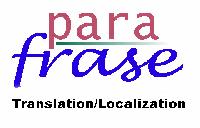| Pages in topic: < [1 2 3 4] > | ProZ.com: pros...or dangerous amateurs? Thread poster: FranH (X)
|
|---|
| Ethical behavior? | Apr 18, 2002 |
I thought I read somewhere in this thread something about professional translators subscribing to a special code of ethical behavior. Does that code apply only to relationships with customers? That\'s pretty neat.
| | | | John Kinory (X)
Local time: 14:48
English to Hebrew
+ ...
| Peer review only AFTER gaining a (higher/research) degree | Apr 18, 2002 |
Quote:
On 2002-04-18 02:05, nonogogo wrote:
A good translator has a lot of knowledge and it is like knowledge from any profession.
BUT
I believe one can become a good translator without necessarily going to translating school or having a diploma. BUT, the person doing this has learned by doing. I\'m in favor or accreditation by PEER REVIEW. That\'s how good science is carried on also. Not by the diplomas...how
... See more Quote:
On 2002-04-18 02:05, nonogogo wrote:
A good translator has a lot of knowledge and it is like knowledge from any profession.
BUT
I believe one can become a good translator without necessarily going to translating school or having a diploma. BUT, the person doing this has learned by doing. I\'m in favor or accreditation by PEER REVIEW. That\'s how good science is carried on also. Not by the diplomas...how many people realize that? In that sense, translation is like science...
That\'s all for now. Please let\'s not fight. Let\'s get something done...
Jane,
True, as far as it goes. But I am not aware that anyone without a PhD is going to get many papers published in scientific journals, peer review or not peer review.
[addsig] ▲ Collapse
| | | | Werner George Patels, M.A., C.Tran.(ATIO) (X)
Local time: 09:48
German to English
+ ...
| I was wondering about the same thing, Kim | Apr 18, 2002 |
Quote:
On 2002-04-18 02:07, kmetzger wrote:
I thought I read somewhere in this thread something about professional translators subscribing to a special code of ethical behavior. Does that code apply only to relationships with customers? That\'s pretty neat.
I, too, find it bewildering that a moderator, of all people, should throw around such insulting and condescending language (\"childish\"... See more Quote:
On 2002-04-18 02:07, kmetzger wrote:
I thought I read somewhere in this thread something about professional translators subscribing to a special code of ethical behavior. Does that code apply only to relationships with customers? That\'s pretty neat.
I, too, find it bewildering that a moderator, of all people, should throw around such insulting and condescending language (\"childish\", etc.)!
In effect, our \"learned friend\" has called all lawyers, doctors, accountants, etc. \"childish\" for organizing themselves as professionals (I hope none of his lawyer, doctor, etc. clients read his comments). And how about a moderator who doesn\'t even know the difference between \"language learning\" and \"translation skills\"? (After all, that\'s why translation programs require their students to be fully proficient in their working languages; they are required to take an aptitude test before they are admitted into such a program. Most of these translation schools point out that they are not \"language schools\", but graduate schools for professional translators/interpreters.). But that\'s what you get when someone talks about things they don\'t know anything about (you can only talk about schools and training if you have actually been there yourself).
It\'s a real shame when \"backdoor translators\" engage in such conduct (instead of staying hidden so as not to attract too much attention to their \"twilight status\").
[ This Message was edited by: on 2002-04-18 03:59 ] ▲ Collapse
| | | | Werner George Patels, M.A., C.Tran.(ATIO) (X)
Local time: 09:48
German to English
+ ...
Quote:
On 2002-04-18 02:05, nonogogo wrote:
A good translator has a lot of knowledge and it is like knowledge from any profession.
BUT
I believe one can become a good translator without necessarily going to translating school or having a diploma. BUT, the person doing this has learned by doing. I\'m in favor or accreditation by PEER REVIEW. That\'s how good science is carried on also. Not by the diplomas...how
... See more Quote:
On 2002-04-18 02:05, nonogogo wrote:
A good translator has a lot of knowledge and it is like knowledge from any profession.
BUT
I believe one can become a good translator without necessarily going to translating school or having a diploma. BUT, the person doing this has learned by doing. I\'m in favor or accreditation by PEER REVIEW. That\'s how good science is carried on also. Not by the diplomas...how many people realize that? In that sense, translation is like science...
That\'s all for now. Please let\'s not fight. Let\'s get something done...
But the discussion really revolves around establishing rules and regulations for our profession. As I pointed out, I don\'t care how you acquire your translation skills (school, mentoring), as long as admission to our profession is regulated and standards are defined (as is the case for lawyers and all other professions). Take lawyers in the UK, for example: you can go to law school or you can train with lawyers (\"formal\" vs. \"informal\" route).
Again, it is a real pain to see that we are the only profession where any bum can just come along and harvest what others have sown. And unless we change that, translators will never be as regarded and recognized as other professions are. An even greater pain are those \"interlopers\" that keep telling us that we don\'t even have the right to protect our profession or to set standards, and they will always come crawling out of the woodwork trying to silence the few professionals this site has. ▲ Collapse
| | |
|
|
|
Rick Henry 
United States
Local time: 08:48
Italian to English
+ ...
| I wish people would stop comparing translators to lawyers and doctors | Apr 18, 2002 |
My take on it is that translators have more in common with musicians. A (good) musician has innate talent. What this musician choses to do with this talent can be many things. S/He can develop her/his craft, and yes I believe it\'s a craft just as much as translating is a craft, by taking lessons and studying - privately, or through the university. They key to improving any craft is a combination of study - in any form, and practice. Without BOTH of those things you\'ll only get half the pi... See more My take on it is that translators have more in common with musicians. A (good) musician has innate talent. What this musician choses to do with this talent can be many things. S/He can develop her/his craft, and yes I believe it\'s a craft just as much as translating is a craft, by taking lessons and studying - privately, or through the university. They key to improving any craft is a combination of study - in any form, and practice. Without BOTH of those things you\'ll only get half the picture.
R.
== ▲ Collapse
| | | | Werner George Patels, M.A., C.Tran.(ATIO) (X)
Local time: 09:48
German to English
+ ...
Quote:
On 2002-04-18 03:43, Rick Henry wrote:
My take on it is that translators have more in common with musicians. A (good) musician has innate talent. What this musician choses to do with this talent can be many things. S/He can develop her/his craft, and yes I believe it\'s a craft just as much as translating is a craft, by taking lessons and studying - privately, or through the university. They key to improving any craft is
... See more Quote:
On 2002-04-18 03:43, Rick Henry wrote:
My take on it is that translators have more in common with musicians. A (good) musician has innate talent. What this musician choses to do with this talent can be many things. S/He can develop her/his craft, and yes I believe it\'s a craft just as much as translating is a craft, by taking lessons and studying - privately, or through the university. They key to improving any craft is a combination of study - in any form, and practice. Without BOTH of those things you\'ll only get half the picture.
R.
==
Very good point! To quote one of my professors (a leading conference interpreter in her field and a member of AIIC):
People who speak a few languages without formal training are like \"hobby musicians\": they play at home or in the garage or among friends.
Concert pianists, opera singers, etc. have gone through gruelling training at a conservatory, practising for hours every day. And professional translators/interpreters are the \"concert pianists\", \"opera singers\", etc. of the language industry.
In other words, those detractors that attack anyone who favours rules for our profession are just \"hobby musicians\"; the rest of us give concerts at The Met.  ▲ Collapse
| | | | | Answer to Fran. | Apr 18, 2002 |
Dear Fran,
I apologise humbly and shamefaced for my misspelling. You are quite right; it should be ”whinging”.
Whinging does not help, doing does.
Thank you very much for the correction.
Sven.
| | | | | Question to Werner. | Apr 18, 2002 |
Dear Werner,
May I conclude from your statement that musicians without formal training, like Louis Armstrong, and conservatory dropouts, like Elton John, should, in your opinion, have been, respectively be, confined to “play at home or in the garage or among friends”?
Best regards,
Sven.
| | |
|
|
|
diana bb 
Lithuania
Local time: 16:48
English to Lithuanian
+ ...
| specialisation could be the answer | Apr 18, 2002 |
I do not think this issue would have arisen in the first place if some translators were honest enough to themselves to admit that they do not understand or lack expertise in certain areas. But,as Euripides observed many centuries ago, \'Money is far more persuasive than logical arguments.\' Most probably I am not very clever myself (and I\'m sure it will be confirmed by some participating in this discussion), but I really fail to understand how some people can be equally proficient in a large nu... See more I do not think this issue would have arisen in the first place if some translators were honest enough to themselves to admit that they do not understand or lack expertise in certain areas. But,as Euripides observed many centuries ago, \'Money is far more persuasive than logical arguments.\' Most probably I am not very clever myself (and I\'m sure it will be confirmed by some participating in this discussion), but I really fail to understand how some people can be equally proficient in a large number of fields of expertise. Why not admit you do not understand this or that? Specialisation is not such a bad thing, after all. Were this the case, less people would lose their fingers in lawnmowers, and less people would die of doctors\' errors caused by bad (irresponsible?) translations.
A question - too personal, I believe - to Werner: How old are you?
Respectfully yours,
Diana ▲ Collapse
| | | | | As a rogue translator I beg your advice, please. | Apr 18, 2002 |
I am one of those translators who should be hiding in the shadows so that my mistakes do not offend those translating in blissful competence.
Arguments in my defense:
I have lived the first half of my life in Germany, the second half in the United States. My highest degree is Dr. rer. nat. (PhD) in Chemistry (Biochemistry).
The German university admissions system required the \"Great Latinum\" (or another old language) and 6 years of English (... See more I am one of those translators who should be hiding in the shadows so that my mistakes do not offend those translating in blissful competence.
Arguments in my defense:
I have lived the first half of my life in Germany, the second half in the United States. My highest degree is Dr. rer. nat. (PhD) in Chemistry (Biochemistry).
The German university admissions system required the \"Great Latinum\" (or another old language) and 6 years of English (or another modern language).
Please, tell me: Should I now (having worked as a translator for quite a while) be forced to shell out 1000s of dollars for courses, which in quality do not come close to those that I have already taken?
Maybe, some of you nice people could start including all the facts for all of us? I know some of you and thought that begging might help some.
▲ Collapse
| | | | Werner George Patels, M.A., C.Tran.(ATIO) (X)
Local time: 09:48
German to English
+ ...
Quote:
On 2002-04-18 12:46, mayet wrote:
I am one of those translators who should be hiding in the shadows so that my mistakes do not offend those translating in blissful competence.
Arguments in my defense:
I have lived the first half of my life in Germany, the second half in the United States. My highest degree is Dr. rer. nat. (PhD) in Chemistry (Biochemistry).
The German univ
... See more Quote:
On 2002-04-18 12:46, mayet wrote:
I am one of those translators who should be hiding in the shadows so that my mistakes do not offend those translating in blissful competence.
Arguments in my defense:
I have lived the first half of my life in Germany, the second half in the United States. My highest degree is Dr. rer. nat. (PhD) in Chemistry (Biochemistry).
The German university admissions system required the \"Great Latinum\" (or another old language) and 6 years of English (or another modern language).
Please, tell me: Should I now (having worked as a translator for quite a while) be forced to shell out 1000s of dollars for courses, which in quality do not come close to those that I have already taken?
Maybe, some of you nice people could start including all the facts for all of us? I know some of you and thought that begging might help some.
Have most of you lost the ability to read and assimilate information? This is not about degrees, but about rules for our profession.
Ursula, no one is asking you to fork over thousands of dollars; there are two ways of getting your translation-specific training: \"formal\" vs. \"informal\" route (see above).
Frankly, I don\'t see the problem. Many of you have asked here and in other threads: What can be done to stop the rate decline? What can we do to be recognized as professionals?
Well, the answer is \"simple\": to achieve these objectives, translators will have to organize in the same manner as all other professions have.
In Canada, these things have been achieved to a large extent (95%). Canadian clients will always ask for a translator certified by one of the provincial associations or accredited by the Translation Bureau. Certification is obtained through exams or peer review, and accreditation through peer review (Translation Bureau). So, if you don\'t like this way, too bad for you. In Canada, we are fully recognized as professionals (and we always get mentioned in the same breath with lawyers, etc.). If you don\'t want to achieve the same level of recognition in your countries, suit yourself!
[ This Message was edited by: on 2002-04-18 13:24 ] ▲ Collapse
| | | | Jacek Krankowski (X) 
English to Polish
+ ...
| The very nature of an open Internet marketplace... | Apr 18, 2002 |
will fuel this sort of discussions (= \"Is ProZ pros or amateurs\") ad infinitum. I subscribe to a couple of narrowly specialized discussion lists where, as I said before, members are in the hundreds and not in the dozens of thousands. I know that in those two fields, which account for 90% of what I translate, I always can count on expert help. But what about the remaining 10%? Should I refrain from asking a KudoZ question re plasmids only because 4 out of 5 answers will be wrong? So what? ... See more will fuel this sort of discussions (= \"Is ProZ pros or amateurs\") ad infinitum. I subscribe to a couple of narrowly specialized discussion lists where, as I said before, members are in the hundreds and not in the dozens of thousands. I know that in those two fields, which account for 90% of what I translate, I always can count on expert help. But what about the remaining 10%? Should I refrain from asking a KudoZ question re plasmids only because 4 out of 5 answers will be wrong? So what? What interests me is that the fifth answer may provide me with important clues and that is what I like about the KudoZ system in the real world. All the rest is virtual vanity. If someone does not know how to separate the KudoZ wheat from the chaff, too bad for them. Such asker is then as bad a translator as his amateur answerers.
BTW, I still do not quite understand how people could die because of a bad translation. Any pharmaceutical company would go belly up if their info leaflets relied on what some translator somewhere said. Same for medical equipment manufacturers and hospitals. And if I were a doctor, I cannot imagine making a diagnosis or administering a treatment based on what a translator or interpreter would be telling me the pain is. OK, maybe with the exception of an emergency, but then, mistakes can be made even without the language barrier.
▲ Collapse
| | |
|
|
|
| Let's talk about translators, not doctors, lawyers, musicians..... | Apr 18, 2002 |
Quote:
Very good point! To quote one of my professors (a leading conference interpreter in her field and a member of AIIC):
People who speak a few languages without formal training are like \"hobby musicians\": they play at home or in the garage or among friends.
Concert pianists, opera singers, etc. have gone through gruelling training at a conservatory, practising for hours every day. And professi
... See more Quote:
Very good point! To quote one of my professors (a leading conference interpreter in her field and a member of AIIC):
People who speak a few languages without formal training are like \"hobby musicians\": they play at home or in the garage or among friends.
Concert pianists, opera singers, etc. have gone through gruelling training at a conservatory, practising for hours every day. And professional translators/interpreters are the \"concert pianists\", \"opera singers\", etc. of the language industry.
In other words, those detractors that attack anyone who favours rules for our profession are just \"hobby musicians\"; the rest of us give concerts at The Met. 
I wish I could speak a few languages, I speak and write only two.
In rebuttal to your quotes:
Edison was a pre-high-school-drop-out. His father considered him \"somewhat dumb\".
Einstein could not get a job after graduation. Neither his grades nor his reputation cut it in the eyes of his \"superiors\".
These are only the two most famous examples, there are many more. Grades are poor predictors for success in a profession or for ethical behaviour.
Since we are considering examples: Many experts in the Enron clique are Harvard graduates. (Now, there they are: They did not know anything, and they did not care. You can see their intelligence shine in committee hearings.)
Of course, I would never think that a certification would not help a basically lazy person with few interests, no aptitude for independent learning and no morals. The problem with degrees (including PhDs and certificates of any kind) is that they are handed to inexperienced people.
Disclaimer:
This was written for the sake of balance. Everyone in this forum with a translator\'s certificate is explicitely excluded from all negative implications.
▲ Collapse
| | | | | In support of Ursula | Apr 18, 2002 |
I believe nobody should be shameful about not understanding or assimilating Werner\'s \"information\", as I find it riddled with warped quasi-logic. The concert pianist analogy is sweet but not very intelligent.
Given Ursula\'s educational and personal background, it is obvious to me that she would be better qualified for translations within her field than a certified translator with merely a general knowledge of the field. But with the proposed system, she would not be allo... See more I believe nobody should be shameful about not understanding or assimilating Werner\'s \"information\", as I find it riddled with warped quasi-logic. The concert pianist analogy is sweet but not very intelligent.
Given Ursula\'s educational and personal background, it is obvious to me that she would be better qualified for translations within her field than a certified translator with merely a general knowledge of the field. But with the proposed system, she would not be allowed to enter into the profession without further education or under the auspices of a mentor programme. I.e. with the experience she has acquired by now, she would be accepted into the fold, but within the proposed system, she wouldn\'t have had the chance to achieve this kind of experience without further education, formal or (formally recognised) informal. ▲ Collapse
| | | | Werner George Patels, M.A., C.Tran.(ATIO) (X)
Local time: 09:48
German to English
+ ...
Quote:
On 2002-04-18 13:50, fidotext wrote:
The concert pianist analogy is sweet but not very intelligent.
So, an accomplished professional, with two Ph.D.\'s, a tenured university professor with tons of publications and professional experience is \"not very intelligent\"? So, how does that statement reflect on you? Also, it was \"not very intelligent\" of you to use \"quasi-logic\"... See more Quote:
On 2002-04-18 13:50, fidotext wrote:
The concert pianist analogy is sweet but not very intelligent.
So, an accomplished professional, with two Ph.D.\'s, a tenured university professor with tons of publications and professional experience is \"not very intelligent\"? So, how does that statement reflect on you? Also, it was \"not very intelligent\" of you to use \"quasi-logic\" in this context: so, other professions, like lawyers, that have organized in this manner follow a \"quasi-logic\"??? Gimme a break and get your facts straight.
And who says that translators have only a general knowledge of things? Again, crazy!
CIUTI-accredited translation schools provide expert specialized training in addition to translation courses. CIUTI graduates are not only expert translators, but also highly knowledgeable in a number of specialist areas!
Again, you can only talk about things you know about. If you have never been through such training, you should refrain from making such sweeping and FALSE statements about translators.
And, just for the record: Ursula would easily get accepted through peer review, as far as I can tell. Stop jumping to conclusions!
[ This Message was edited by: on 2002-04-18 16:05 ] ▲ Collapse
| | | | | Pages in topic: < [1 2 3 4] > | To report site rules violations or get help, contact a site moderator: You can also contact site staff by submitting a support request » ProZ.com: pros...or dangerous amateurs? | Protemos translation business management system | Create your account in minutes, and start working! 3-month trial for agencies, and free for freelancers!
The system lets you keep client/vendor database, with contacts and rates, manage projects and assign jobs to vendors, issue invoices, track payments, store and manage project files, generate business reports on turnover profit per client/manager etc.
More info » |
| | Trados Studio 2022 Freelance | The leading translation software used by over 270,000 translators.
Designed with your feedback in mind, Trados Studio 2022 delivers an unrivalled, powerful desktop
and cloud solution, empowering you to work in the most efficient and cost-effective way.
More info » |
|
| | | | X Sign in to your ProZ.com account... | | | | | |










